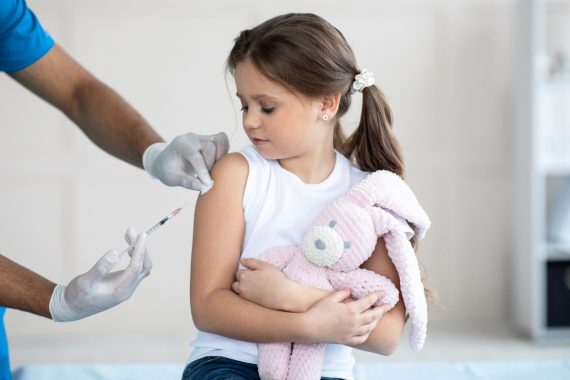Measles outbreaks have now been declared a national incident as top health officials warn that the virus will spread ‘rapidly’ to other areas without ‘urgent action’.
The UK Health Security Agency (UKHSA) has urged action to increase MMR vaccination rates in areas ‘at greatest risk’ following an ongoing outbreak in the West Midlands.
Latest data from this area showed there have been 216 confirmed measles cases and a further 103 ‘probable’ cases since the start of October, with the majority found in Birmingham and among children under 10 years.
UKHSA chief executive Professor Dame Jenny Harries has warned there is a ‘very real risk’ of the virus spreading in other towns and cities due to low vaccine uptake in some communities.
She said: ‘Immediate action is needed to boost MMR uptake across communities where vaccine uptake is low.
‘We know from the pandemic that the communities themselves, and those providing services within them, will have the knowledge to best support local families to understand the risks of measles, to learn more about the vaccines that can protect them and to enable innovative vaccine delivery approaches.’
The agency confirmed that a national incident is an ‘internal mechanism’ which signals the ‘growing public health risk’ and allows them to focus efforts on limiting further spread.
Birmingham City Council told schools yesterday that most of the children with measles have not had their MMR vaccine, and relayed UKHSA advice for parents not to go to their GP practice in person if they suspect their child has the virus.
Across England and Wales, there were 64 suspected cases of measles in the first week of January, almost half of which were in the West Midlands.
Suspected cases have risen dramatically over the last year – the total number of suspected cases in 2023 was 1,613, compared with 730 in 2022.
And from January to November last year, there were 209 confirmed cases, with 43 new cases in November alone, which UKHSA said is ‘mainly due to outbreaks in the West Midlands and Yorkshire and the Humber’.
Professor Sir Andrew Pollard, Ashall Professor of infection and immunity at the University of Oxford, said the situation is ‘very worrying indeed’ and that many children are at risk due to vaccination rates having fallen in London and other areas.
‘The mortality rate is from 1 in 3,000 to 1 in 5,000 in high income countries but much higher in low income countries. The clock is ticking to get children who have missed doses vaccinated before this virus kills,’ he added.
Pulse reported at the start of the month that GPs were seeing children with measles as well as whooping cough, sometimes for the first time in their career, amid the impact of waning vaccination rates.
The agency’s annual figures showed that in England MMR vaccine uptake for first and second doses by five years has fallen to the lowest rates since 2010/11.
And no vaccines met the World Health Organisation (WHO) 96% uptake target in England.

















Is an ‘incident’ a new term for ‘epidemic caused by inept and corrupt Government’ then ?
“Plus ca change, plus c’est la meme chose”.
1969 was my first GP job – in mining community – arriving in the midst of a measles outbreak. Pretty grim.
Here we are, 50+ years later – there’s progress for you.